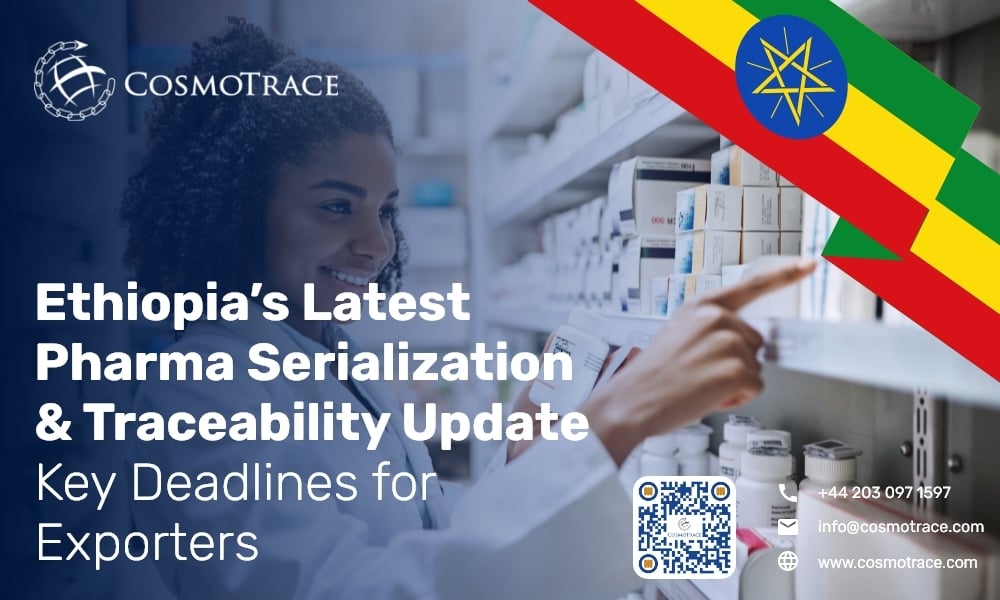The Ethiopian Food and Drug Authority (EFDA) has released a crucial update regarding its national pharmaceutical traceability initiative. This marks a significant step toward achieving a fully traceable pharmaceutical supply chain in Ethiopia, in line with global standards for serialization and aggregation.
If you're a pharmaceutical manufacturer exporting medicines for sale or distribution in Ethiopia, here’s what you need to know and do right now.
EFDA's Traceability Hub Is Launching in 2025
To strengthen product safety and combat counterfeit medicines, EFDA is rolling out its centralized traceability system EFDA-MVC (Medicine Verification and Control) to capture and monitor medicine movement from manufacturing to distribution.
The EFDA-MVC web portal will officially go-live was on June 26, 2025, kicking off the onboarding process for exporters.
Key Compliance Deadlines for Exporters
EFDA’s latest notice outlines three major deadlines for pharmaceutical companies that export to Ethiopia:
- EFDA-MVC Portal Signup Deadline: July 25, 2025
All pharmaceutical manufacturers exporting to Ethiopia must register with the EFDA-MVC traceability hub by this date. This is the first step in enabling your organization to comply with the national reporting requirements.
- Start Reporting Traceability Events: June 3, 2026
Exporters are required to begin reporting all traceability events for their products by this deadline. This includes key events like product commissioning, shipping, receiving, and decommissioning—based on global EPCIS (Electronic Product Code Information Services) standards.
- Aggregation Event Reporting Grace Period Ends: December 1, 2026
Until this date, aggregation reporting is optional. Afterward, companies must report aggregation events, which link individual saleable units to their parent packaging (e.g., cartons, pallets). This is essential for enabling full supply chain visibility and verification.
What This Means for Exporters
If you’re currently exporting medicines to Ethiopia or planning to, these steps are essential:
- Register early on the EFDA-MVC portal once it launches in June 2025.
- Ensure your products are serialized with GS1-compliant 2D DataMatrix barcodes, including GTIN, serial number, batch number, and expiry date.
- Integrate traceability systems capable of sending EPCIS event data to EFDA.
- Prepare for aggregation, even if not required until late 2026. Aggregation improves operational efficiency and simplifies compliance.
Compliance Timeline At a Glance
|
Requirement |
Deadline |
Details |
|
EFDA-MVC Traceability Hub Signup |
July 25, 2025 |
All pharmaceutical manufacturers exporting to Ethiopia must register in the EFDA-MVC portal. |
|
Start Reporting Traceability Events |
June 3, 2026 |
Mandatory to begin reporting traceability events (e.g., commissioning, shipping, receiving) for medicines. |
|
Aggregation Reporting Grace Period Ends |
December 1, 2026 |
Aggregation events must be reported by this date. This allows tracking of parent-child packaging relationships (e.g., carton to bottle). |
|
EFDA-MVC Web Portal Go-Live |
June 26, 2025 |
The system will officially launch to start onboarding companies. |
Get Ready Now
With the traceability system rolling out in phases, early preparation is critical. Pharmaceutical companies should align serialization technology, ERP systems, and third-party logistics (3PLs) to meet Ethiopia’s regulatory expectations well ahead of time. EFDA’s traceability initiative represents a major milestone in safeguarding public health and ensuring supply chain integrity. By meeting these deadlines, exporters will not only stay compliant but also contribute to a safer, more transparent pharmaceutical ecosystem in Ethiopia.
‘Need help getting ready? Whether it’s system integration, GS1 barcode compliance, or EPCIS reporting, our team is here to support your serialization and traceability journey’.

